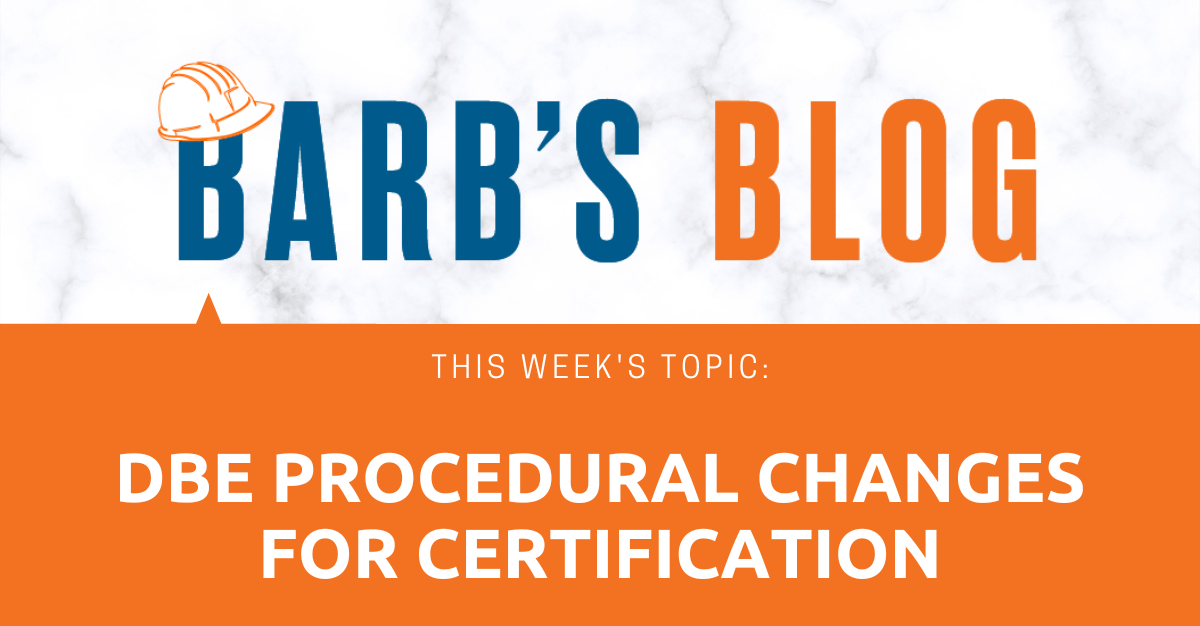
DBE Final Rule Blog Series:
The Department of Transportation proposed new rules to the Disadvantaged Business Enterprise (DBE) program with public listening and comment period in 2022. The intent of the new rules was to modernize and improve the program, reduce burdens to firms, grow capacity and owner wealth and improve integrity and data for the program. The final rule changes went into effect May 9, 2024. All new rules are in effect as of May 9, 2024. Any decisions on applications after that date must use the new rules. I have been participating in training for the changes and in this series, I will break down the changes for you all in the different areas.
DBE Procedural Changes for Certification
The DBE program as developed by the DOT was specific to contractors performing work on DOT related scopes of work. The new rule changes regarding getting certified are specific to ensuring the directory of DBEs will specifically work on projects specific to transportation (MnDOT/MAC/MetCouncil). One of the changes is regarding the Nature of Work Performed: The firm must provide, with examples, the type(s) of work they envision performing on DOT contracts. The certifier should explore this work during the onsite visit, and if a firm has no intention of pursuing DOT-assisted contracts the certifier should encourage the applicant to withdraw.
If you are wondering how this will affect certification applications with MnUCP for the City of Minneapolis’s program the answer isn’t clear, but I will keep you informed.
Another clarification in the program applies to Curative Measures to Correct Ineligibility. The certifier may notify a firm of eligibility concerns and give the firm time to remedy impediments to certification. The firm may take curative action (and present evidence of such) up to the time of the certifier’s decision. The certifier may provide general assistance and guidance but not professional advice or opinions on the curative measure. Certifiers may not impede attempts to cure but can set realistic deadlines for the applicant to fix problems. Note however that fraud renders the firm ineligible and subjects it to sanctions, suspension, debarment, criminal prosecution, civil litigation, and other consequences.
The term recertification will no longer apply. The Declaration of Eligibility (DOE) will be done on an annual basis and will include and document gross receipts for its most recently completed fiscal year. Note gross receipts are to be calculated on a cash basis regardless of the DBE’s overall accounting method.
One of the biggest changes in procedure is around Interstate Certification. I am excited about this change, particularly for firms that do work in other states. Now when a DBE applies to another state for the DBE certification, the new state must accept the DBE’s certification from its jurisdiction of original certification. If you are certified as a DBE in Minnesota, you can now apply to another state DBE program with a streamlined reciprocity style process. Also, if you become decertified in one state with cause, you will be decertified in all other states as well.
There is also a very defined process and timeline for decertification included in the new rules. It starts with the Burden of proof – The certifier must prove by a preponderance of evidence that the DBE does not meet the certification standards. Remember if you have proof send it to the certifier or to me and I will provide it to the certifier for review of eligibility. A Notice of Intent (NOI) is sent to the DBE stating reason for action and supporting evidence, including a notification of the DBE’s rights to respond (which must be done in 20 days) and a hearing date of between 30 and 45 days. If the DBE is suspended or debarred for conduct related to the program the certifier issues a Notice of Decertification and does not require an opportunity for the DBE to respond. If the DBE is denied or decertified, they are allowed to reapply no less than 12 months after the denial was issued.
Suspension of Certification – Situations involving serious, rapidly developing, and obvious threats to program integrity and lapses to compliance that can’t be adequately resolved timely can utilize one of two options for suspension:
- Mandatory Suspension: The certifier has clear and credible evidence of the DBE’s involvement in fraud or other serious criminal activity, or
- Elective Suspension: The certifier has discretion to suspend if it has clear and credible evidence that the DBE’s continued certification poses a substantial threat to program integrity.
- The certifier may elect to suspend the same DBE just once in any 12-month period.
This series is intended to give you a high overview of the new rules in bite size packages. Upcoming topics will be ownership requirements, new supplier rules, DBE counting after decertification or sale of business to non-DBE, and prompt payment requirements. More detailed information on the changes in this issue can be found here. AWC supported most of the changes in part because there is less ambiguity, and there will be more valuable data resources over the next few years.
— B
This is part 1 of the DBE Final Rule Change Blog Series. Click here to read part 2: “DBE Supplier Definitions & Counting.”
